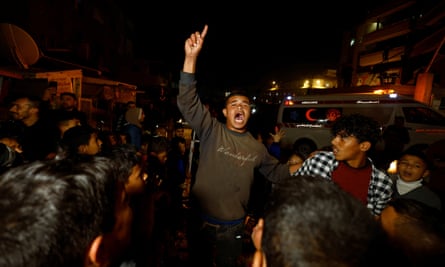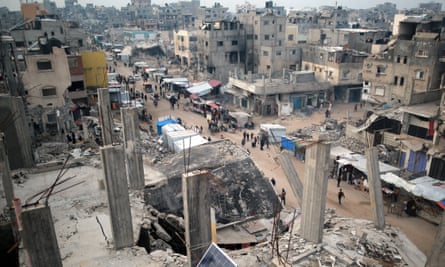In the battered ruins of Gaza City, the tent encampments of al-Mawasi and the half-empty streets of Rafah, there are fervent prayers that the ceasefire deal between Israel and Hamas is concluded.
After so many false hopes of an end to the war over 15 months of fighting, the fear of disappointment is acute.
“We are very nervous that this deal will be rejected and the war will continue, and our suffering continue with it. Everyone will be very sad if it didn’t work this time,” said Muhammad Abu Kmail, 35, a digital marketing consultant from northern Gaza. “We feel so stressed that we are unable to plan and think of what we will do in the next stage if there is peace.”
The conflict has devastated Gaza, killing more than 46,000 Palestinians and displacing most of the territory’s prewar population of 2.3 million.
“I am afraid! I am afraid in the last moments that I will lose someone close to me; I have already lost many,” said Reham Yasser Al-Najjar, 24, currently living in Gaza City.
The likely deal would involve 34 of the roughly 100 hostages held by Hamas being exchanged for many hundreds of, or possibly 1,000, Palestinian prisoners held in Israeli jails. Israel would also withdraw its forces from some of Gaza, allow free passage for displaced people back to their homes in much of the territory and permit more aid to reach the needy.
But much remains uncertain. Even if the warring sides agree to the deal, there will be further negotiations before there is a definitive ceasefire and the release of all the hostages. Palestinians, Arab states and Israel are also yet to agree on a common vision for the administration and reconstruction of Gaza after the war.

“There is absolutely no answer to the question of who will be in charge of Gaza the day after a ceasefire,” said Mkhaimar Abusada, a political scientist at al-Azhar University in Gaza.
The challenges of running and rebuilding the territory are enormous. It would take a fleet of 100 lorries 15 years to clear Gaza of rubble and cost between $500m (£394m) and $600m, a UN assessment earlier this year found.
Tented camps now stretch across what were once beaches and fields. Almost all the territory’s basic infrastructure – power cables, sewers, water pipes – has been destroyed, along with much of its healthcare system.
Abusada said people in Gaza were “tired” of Hamas and recognised that investment and humanitarian aid would be restricted if the Islamist militant organisation retained administrative control in the territory. “They know that no international country will spend a dollar if Hamas is in charge, so they want the PA or any other entity,” he said.
Earlier in the conflict, the US pushed Israel to allow the Palestinian Authority (PA), which has partial governing power in the occupied West Bank, to take over Gaza. But Israel has opposed rule by the PA, which was set up under the Oslo interim peace accords three decades ago.
Egypt is believed to have blocked a proposal by the United Arab Emirates and the US to send a force of international peacekeepers into Gaza and set up a provisional administration there, potentially under the auspices of the UN. Instead, Cairo has proposed that a “community support committee” of notables and officials should be formed to run Gaza.
Abu Kmail said: “I am not interested in political matters and who will rule Gaza, but we want a fair administration that will rebuild the future of Gaza and restore stability and security, because we and the people here are very tired.”

Ahmed El-Belbisi, 41, from Rafah, said he had no strong opinion but hoped that “those who will run the Gaza government will put the right people in the appropriate places to improve the conditions of the people and help the people to reconstruct themselves, and work to rebuild Gaza and its stability”.
Youssef Balousha, a 53-year-old sports photographer from Gaza City, said he wanted the PA to run Gaza “like they used to run it in the past, and that security will be like then”.
Others had different memories of the PA’s government of Gaza, which ended in 2007 when Hamas seized control violently.
“I’m choosing the PA to rule Gaza Strip after the war is over, though during Hamas’s rule life was truly safe and, as I remember, during the PA rule, girls were afraid to go out at night or stay out late,” said Wadiha Al-Attar, a 37-year-old from northern Gaza.
Fighting was continuing across Gaza on Wednesday despite the efforts to reach a ceasefire, with reports that Israeli strikes had killed at least 13 Palestinians.
Israel says 98 hostages are being held in Gaza, about half of whom are believed to be alive. They include Israelis and non-Israelis. Of the total, 94 were seized in the October 2023 Hamas attack on Israel, in which about 1,200 people were killed. One hundred and five hostages were freed in a short-lived truce in November 2024 in exchange for 240 Palestinian prisoners in Israel.

.png) 3 months ago
36
3 months ago
36













































